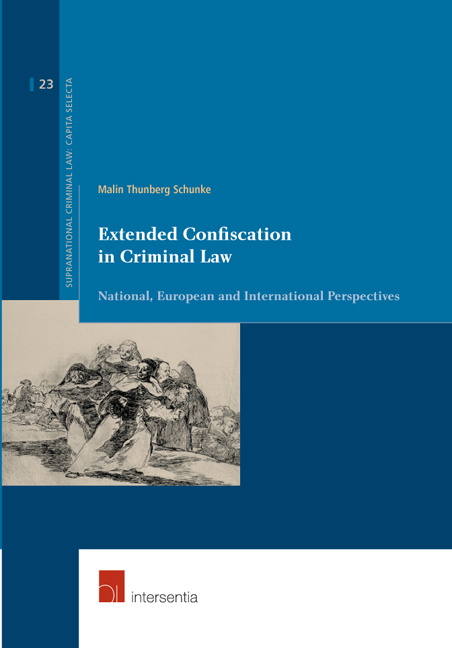Book contents
- Frontmatter
- Preface
- Contents
- Table of Cases
- List of Abbreviations
- Part I Introduction
- Part II Substantive Provisions on Extended Confiscation
- Part III The Legal Framework for International Cooperation
- Chapter 8 International Cooperation in the Area of Confiscation
- Chapter 9 Cross-Border Asset Tracing and Exchange of Information
- Chapter 10 International Cooperation in Order to Seize or Freeze Assets
- Chapter 11 International Cooperation in Order to Execute Final Confiscation Orders
- Chapter 12 The Proposal for a Regulation on Mutual Recognition
- Chapter 13 Final Remarks: “To Go for the Money” – But How?
- Bibliography
- Index
- About the Author
Chapter 12 - The Proposal for a Regulation on Mutual Recognition
from Part III - The Legal Framework for International Cooperation
Published online by Cambridge University Press: 11 October 2018
- Frontmatter
- Preface
- Contents
- Table of Cases
- List of Abbreviations
- Part I Introduction
- Part II Substantive Provisions on Extended Confiscation
- Part III The Legal Framework for International Cooperation
- Chapter 8 International Cooperation in the Area of Confiscation
- Chapter 9 Cross-Border Asset Tracing and Exchange of Information
- Chapter 10 International Cooperation in Order to Seize or Freeze Assets
- Chapter 11 International Cooperation in Order to Execute Final Confiscation Orders
- Chapter 12 The Proposal for a Regulation on Mutual Recognition
- Chapter 13 Final Remarks: “To Go for the Money” – But How?
- Bibliography
- Index
- About the Author
Summary
THE BACKGROUND TO THE PROPOSAL
On 21 December 2016, the European Commission issued a package of legislative measures aimed at strengthening the EU ‘ s capacity to fight the financing of terrorism and organised crime. The focus of this action was three pieces of legislation in the area of money laundering, illicit cash movement and the freezing and confiscation of assets.
In this context, the Proposal for a Regulation on Mutual Recognition was presented. The purpose of this proposal is to provide for one single legal instrument on the recognition and execution of freezing orders and confiscation orders within the EU. The Proposal for a Regulation on Mutual Recognition is therefore intended to establish a comprehensive framework for international cooperation covering both the freezing and confiscation of proceeds of crime. It lays down the rules under which a Member State must recognise and execute foreign freezing and confiscation orders issued within the framework of criminal proceedings (Article 1). Accordingly, the regulation would replace the FD on Freezing Orders and the FD on Confiscation Orders for the Member States that are bound by these instruments. The framework decisions would, though, continue to apply in relation to those Member States that are not bound by this Regulation. Denmark has announced that it will not take part in the Regulation, and the UK and Ireland may choose whether to opt in.
THE MOTIVES FOR EU ACTION
At the adoption of Directive 2014/42/EU, the Council and the European Parliament both called for further legislative action in order to improve the cross-border enforcement of freezing and confiscation orders. The Proposal for a Regulation on Mutual Recognition is thus a direct answer to these calls. There are many other reasons given by the European Commission for a new instrument. It is inter alia highlighted that:
However, and although existing statistics are limited, the amount of money currently being recovered from proceeds of crime within the EU is only a small proportion: 98.9% of estimated criminal profits are not confiscated and remain at the disposal of criminals. A functioning asset recovery regime is a precondition if more criminal assets are to be seized. This includes an efficient mutual recognition framework for freezing and confiscation orders.
- Type
- Chapter
- Information
- Extended Confiscation in Criminal LawNational, European and International Perspectives, pp. 303 - 322Publisher: IntersentiaPrint publication year: 2017



